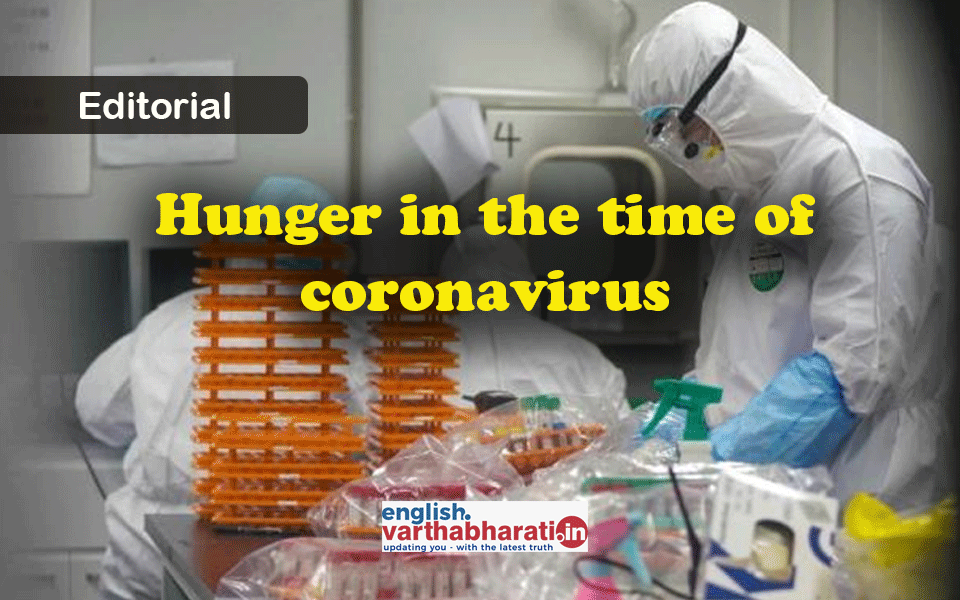Modi wave on the one hand; Corona wave on the other. People are forced to struggle with both these waves. They no longer have the morale to speak up against the Prime Minister who keeps threatening to gift the people with ‘lockdown’. Even if they muster the courage to speak up, they are petrified at the ‘Modi wave’ and anxious about being branded as traitors. While people are desperately asking for food, for the Prime Minister, their cry sounds as a ‘demand for vaccines.’ Even though the Coronavirus is spreading rapidly through the media, people don’t seem interested in getting themselves vaccinated. More than the Coronavirus, they are worried about how to lead their daily lives.
And now, the imposition of curfew in various parts of the state is only increasing the hunger pangs of the people. It appears that the government is adamant that people should not lead their lives peacefully. People’s hunger is only bound to increase the problem of malnutrition substantially that will lead to further spread of fatal diseases such as tuberculosis. The problem of malnutrition is going to haunt the country as the country’s biggest problem of the future, and impact the country’s social, economic, and cultural spheres as well. According to the National Family Health Survey (NFHS) – Round 4, about 38.4 per cent of children below the age of five have not grown to the height appropriate to their age. About 21 per cent of the children do not weigh commensurate to their height. About 35.8 per cent are under weight and about 58.6 per cent are suffering from anemia.
Despite the implementation of several welfare measures, the problem of malnutrition worsened in 2019. According to the 5th round of National Family and Health Survey (2019) in which 22 states and union territories participated, the number of children with stunted physical growth and the number of children with frail bodies has increased in 13 and 12 states respectively. This alarming situation has further aggravated after Covid-19 with apprehensions that a large number of children would be subject to malnutrition in the coming days.
The Centre has now shown some interest in addressing the problem of malnutrition by releasing Rs 20,105 crore under the latest National Nutrition programme. But by imposing lockdown, it appears that the government has planned programmes to increase malnutrition as well. To meet its objective of reducing the deaths of children below five years and to fight against the problem of malnutrition by 2030, the government needs to redesign its strategy and come up with new programmes. In 2015, the Orissa government implemented the Community Management of Acute Malnutrition (CMAM) programme to address the large number of deaths of children below five years in the tribal populated Kandamal district. As part of this programme, the government implemented a range of measures including setting up of clinics close to the tribal areas, providing treatment to children who were suffering from acute malnutrition, and providing nutritious food, hot meals, and rations.
The implementation of this programme and the treatment provided to children helped undernourished children gain weight and regain their health and resulted in the marked improvement of nutrition levels. Orissa’s implementation of community-led welfare programmes in the areas of disaster management, forest management, waste management, and other areas has won accolades. The only state that is giving competition to Orissa in this regard is Kerala.
Currently, the coronavirus and lockdown have turned upside down all programmes related to the curbing of malnutrition. With schools not opening up any time soon, fires to cook hot mid-day meals have not been lit. At the same time, the public distribution system is also in a mess. The poverty rate is increasing while the government’s programmes are faltering. The government that is in a dire economic condition has handed over everything to the private sector and is in the process of washing its hands off, saying “it’s not my duty to run business”. The ultimate result of privatization is that the rich become richer while the poor become poorer. It is not possible to drive away the Coronavirus completely but we should be able to live alongside the Coronavirus. But the government should first understand that it’s not an easy task to live with hunger.
Let the Truth be known. If you read VB and like VB, please be a VB Supporter and Help us deliver the Truth to one and all.
Kalaburagi: Four men have been arrested in Kalaburagi on charge of hacking a man with lethal weapons and pelting stones at him under the limits of Station Bazaar Police Station recently.
According to police sources, Anand Jalak Shinde (34), Ashitosh Jalak Shinde (30), Imran Mehboob Sheikh (28) and Sohaib Anwar Qureshi have been arrested. The men are accused of the brutal murder of Syed Mehboob, a resident of Station Bazaar Upper Line Hamalawadi in the city.
An FIR was filed by the Station Bazaar Police Station based on a complaint given by Syed Ismail, father of the deceased Syed Mehboob.
Following quick probe, the police team successfully arrested the suspects within 24 hours. The arrested men were produced in court and have been sent to judicial custody.
The City Police Commissionerate has appreciated in an official release the police team’s quick solving of the murder case and arrest of the four men accused of murdering Syed Mehboob.





